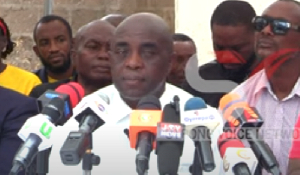Opinions of Monday, 7 October 2013
Columnist: Kennedy, Arthur Kobina
African leaders and leadership
Orangeburg, South Carolina.
5th October, 2013
Africa! It excites the imagination. It is full of potential. Often, it flatters to deceive and to disappoint. Despite the overabundance of natural resources, disease and poverty are endemic. Institutions do not work and there is massive corruption. Whenever there is a military crisis, whether in Liberia, Ivory Coast, Mali or wherever, white boys and girls have to come in from America or France or Britain to fix it while Africa’s youth sit by.
Somehow, predicting that Africa’s golden age is just around the corner has become a cottage industry.
Even as our leaders shrilly claim this as Africa’s century, the poor continue to flee Africa as indicated by the Lampedusa boat disaster. So far, over a hundred bodies have been recovered with another 200 missing and feared dead. Our people are voting—with their feet.
The talk about Africa’s future is always tied to--- leadership--- the lack of it. Ironically some of those who are loudest in decrying the absence of leadership are those who have had a chance to lead in Africa. Obasanjo, Rawlings, Kufuor, Mbeki and others. Somehow, hearing these leaders sound off about leadership reminds me of the old chief driver telling a bus-load of passengers that there are no good drivers anymore. When he does that, it is not clear whether the old driver is bemoaning the deterioration in his skills or the lack of skills in new drivers. When our leaders preach about leadership, are they extolling their own virtues, recognizing their shortcomings or bemoaning the absence of talent around them?
Africa has had many Presidents and Heads of State but very few leaders.
During a speech in April by President Obasanjo, the GNA reported that “according to him all developmental problems facing the continent are as a result of poor leadership.” President Kufuor agrees. According to a “DAILY GUIDE” report, President Kufuor , who has established leadership foundation said “The real bane of our problems is leadership. Some leaders tend to come to office by chance. In local parlance we say they come to office by heart.” During the lecture titled “WHAT MUST AFRICA DO TO CLAIM THE 21ST CENTURY?” the former President asserted that, “Our concern should be about groomed leadership with sharpened acumen to stand eye to eye with others.”
Addressing Ghana’s Parliament in Accra in July 2009, just a short while after Kufuor, Obasanjo and Rawlings had left office, US President Obama declared, “No country is going to create wealth if its leaders exploit the economy to enrich itself--- No business wants to invest in a place where the government skims 20% off the top.” Nobody has challenged President Obama.
The US President was echoing former President Rawlings who is anti-corruption. Speaking in Oslo, Norway in September, 2009, he opined, “If governments are corrupt and do not care about the plight of the suffering masses and if they cannot be held accountable then there cannot be freedom and there cannot be development.” President Obasanjo concurs, telling an audience in Abeokuta, “ I once went to Tanzania because Nyerere recognized Biafra. He told me not to mind his aides. “They will say they have one house in town but their five year-old sons and daughters will have houses all over.”
While these leaders do not reflect on themselves, they imply that they were the kind of leaders Africa needs. But were they?
How do we reconcile what these leaders have been saying against their tenure?
If we accept Mr. Kufuor’s premise about not becoming a leader “by heart” quite a few great leaders would never have been trusted with leadership—including Tony Blair whose only government job was Prime Minister and Abraham Lincoln, whose grooming consisted of 2 years as a Congressman. As Mo Ibrahim put it in critiquing the desire of our leaders to hang around too long, “There is no clearer symbol of this disconnect than the age of those who continue to set the direction of our countries and their citizens. For while the median age of Africa’s population is 20 and falling, the average age of our continent’s leaders is 60.”
While Rawlings’ commitment to fighting corruption is admirable, did he in fact deliver when he had a chance? In his last sessional address, he seemed to be a man who had been beaten by his enemy, corruption. He said “Government on its part has extended an invitation to the World Bank to collaborate in conducting a diagnostic study on corruption in Ghana and how this can be mitigated if not eradicated.” In addition to this admission of policy failure, the former President and/or his cronies have been linked to corruption in Britain( Mabey and Johnson) and in Norway(SCANCEM). While he has not been convicted of these charges, they raise uncomfortable questions about his probity.
One of the most important characteristics of a great leader is how he/she prepares his people for transition from his leadership. Mandela understood this very well. First he chose to stand down after one term as President, to set an example for his country and his party. Second, when he realized that his preference, Ramaphosa was not his party’s choice, he did not try to impose Ramaphosa. According to reports, he summoned Ramaphosa. When Ramaphosa arrived, Madiba said, “You are my choice but Mbeki is the party’s choice and therefore, they will have Mbeki.” That was the mark of a democrat.
Did the way Rawlings, Kufuor and Obasanjo handle their transitions strengthen their parties and their countries?
For Africa, time is running out even as we pay lip service to development, accountability and transformation.
We must welcome the Kufuor Centre for Leadership and begin a vigorous study of our leaders and leadership.
Let the Kufuor Centre study whether Kufuor, Obasanjo and other leaders met the standards that they espouse in their speeches.
Let us determine whether Mr. Rawlings met his own high standards of accountability.
Let us find out why generations after generation, so many of our leaders have been nothing more than echoes of the IMF and the World Bank.
Let us find out why even as the prices of “kome ke sheto”, “yoke gari”, kerosene and tro-tro fares gallop, our leaders shrilly trumpet the falsehood that inflation is under control and that our lives are getting better.
Let us find out why George W. Bush cared more about HIV/AIDS and Malaria than most of our leaders .
Finally, together with our leaders, we must find our own authentic voice. As Emerson put it on behalf of an America emerging from the shadows of European imperialism and capitalism, “We will walk on our own feet, we will work with our own hands, we will speak our own minds.”
Let us move forward together.
Arthur Kobina Kennedy












